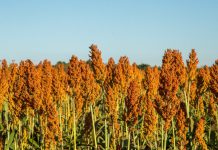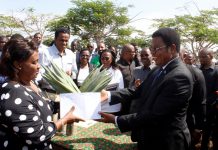TANZANIA Agricultural Research Institute (TARI) Uyole Centre in maize research has come up with a strategy that fully involves agricultural stakeholders and communities to increase adoption and productions.
The Centre Director of TARI-Uyole Centre in Mbeya region, Dr Tulole Bucheyeki told the ‘africa-press’ that full participation of the communities would boost research efficiency and better technology adoption.
The research participatory approach will involve farmers, researchers, stockists, traders, economists, crop post-harvest practitioners and seed companies in the processes cultivating varieties of maize effectively in this growing season.
According to Dr Bucheyeki, the approach would lead to increased adoption of varieties for suitable and accepted characteristics for reliable sales in the market.
On his part, the institution’s Assistant Maize Coordinator in the Highland Maize for Tanzania Agricultural Research Institute, Mr Leonard Sabula said the crop programme is highly committed to promoting maize varieties to ensure high yields, besides the ones which are tolerant to diseases and insects’ attacks.
He further noted that TARI Uyole has already released varieties with cooking qualities and market.
“The released varieties can yield up to 40 bags of 90 kilogram (kg) per acre with more than eight varieties, which include TARI ZH 6305, TARI ZH 615 ST, TMV2, UH 615, UH 6303, UHS 5350, UHS 5210, UHS 401 available at the institute and if used with good management, a bumper harvest is expected,” said Mr Sabula.
He further said that maize is a remarkable staple food that the human society depends on for food, health, cash, economic growth, industry raw materials and employment.
He added that Tanzania’s 45 per cent of cultivated land is planted with maize, where again 45 per cent of the total production comes from the Southern Highland Zone.
“TARI Uyole in Mbeya region conducts maize research, beans, round potatoes, pyrethrum agromechanisation.
It also carries research on crops, which include wheat, soybean, sweet potatoes, fruit trees and finger millet” TARI Director General, Dr Geoffrey Mkamilo further elaborated.
According to TARI, Tanzania should use various technologies, which address challenges it is facing in her communities especially in the national industrial economy drive by 2025.
TARI is also actively engaged in the technology transfer with the main purpose of reaching more farmers and other agricultural stakeholders.
Dr Mkamilo said that the country is now posed to achieving the highest level of agricultural production with support to the farmers in the industrial drive. TARI has the mandate of disseminating research results to stakeholders and scientific communities, including the grassroots farmers and consumers.







